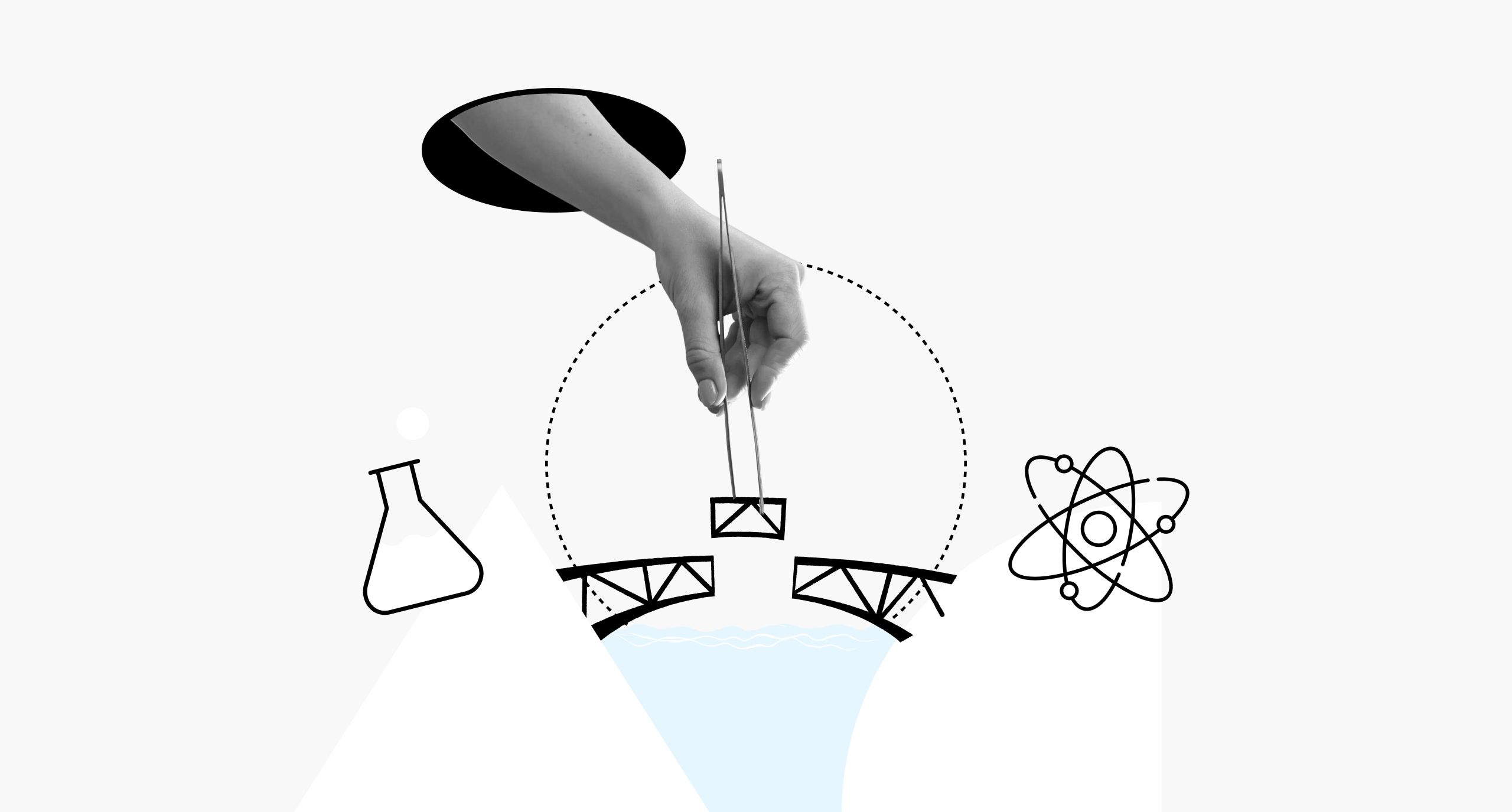The 2023 Transatlantic Conference ushered in a chapter for EU-US cooperation in matters regarding geopolitics, security, energy and technology. The recently-concluded event was jointly organized by IE School of Politics, Economics & Global Affairs, the Yale Jackson School of Global Affairs, Sciences Po Paris School of International Affairs and the Johns Hopkins School of Advanced International Studies.
Now in its third year, the Transatlantic Conference gathers top academic experts, senior industry practitioners and fellows from each organizing institution for high-level, closed-door debate on transatlantic affairs, international relations and global governance.
It also aims to immerse students in the real world while giving them a chance to hear from global leaders about some of the bloc’s most pressing issues.
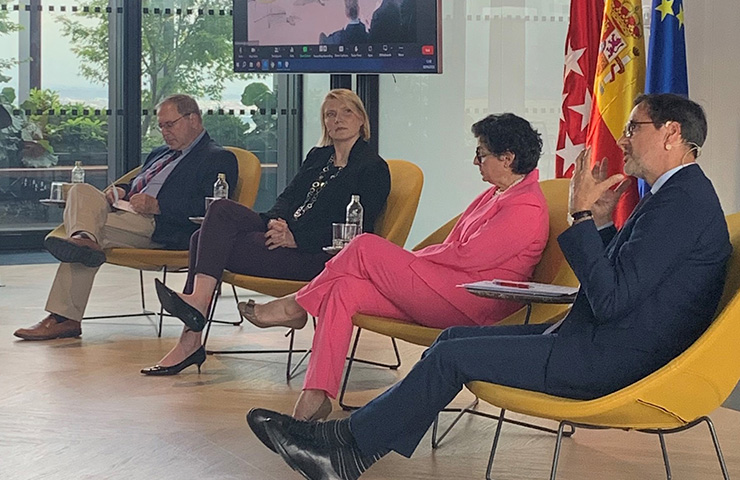
The conference took place between June 2-4 and was held at IE University’s Segovia campus and the high-tech IE Tower in Madrid.
A year in review
The conference was first instituted by the Transatlantic Relations Initiative (TRI) at IE University. In short, the TRI is mandated with the duty to foster EU-US relations by encouraging interdisciplinary cooperation in addressing the challenges and emerging opportunities in the Atlantic world.
Held on the heels of NATO’s 2022 Madrid Summit, this year’s conference gave participants a chance to analyze the effects of the new Strategic Concept that resulted from the historic meeting. IE School of Politics, Economics & Global Affairs students—like Jack Radford, Diana Amable, Radhika Joshi and Mariana Ferreira—also gained valuable insights into the current state of transatlantic relations in an increasingly dynamic and complex global landscape from preeminent thought leaders.
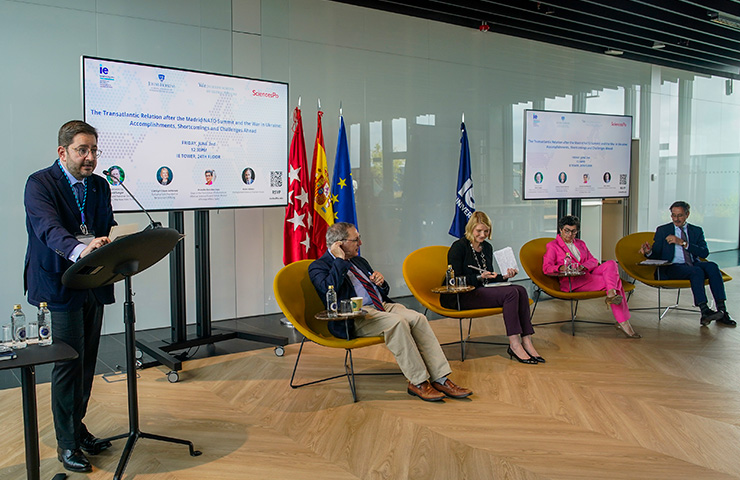
In fact, the conference began with a public panel titled “The Transatlantic Relation after the Madrid NATO Summit and the Start of the War in Ukraine: Accomplishments, Shortcomings and Challenges Ahead.”
It was led by a distinguished panel of experts, including Cathryn Clüver Ashbrook, the executive vice president of Bertelsmann Stiftung; Arancha González Laya, former Spanish Minister of Foreign Affairs and Dean of the Paris School of International Affairs at Sciences Po; and Sir Robin Niblett, a distinguished fellow at Chatham House. The panel was moderated by the chief White House and national security correspondent for the New York Times, David Sanger.
Focused on cooperation
As current students of the Master in International Development, Jack, Diana, Radhika and Mariana approached the 2023 Transatlantic Conference as a valuable opportunity for learning, growth and impact. According to Jack, the forum provided “a platform for multilateral conversations on emerging global issues that intersect tech, defense and energy. Such discussions will only become increasingly important as we enter a period of profound international upheaval and societal change.”
Diana highlighted her discovery of the wide-reaching implications of transatlantic cooperation, which has a “strong positive impact on various sectors,” such as trade and innovation among others. She also noted the importance of the event as it allows for “a continuous assessment and analysis of emerging challenges and geopolitical shifts,” which will only put the region on the path to informed decision-making.
Radhika also pointed out the importance of the event as “it brings together scholars and great minds with great opinions from across the world into one room to discuss the most pressing problems of today,” which is particularly important in our current political climate which Mariana notes is presenting us with “unprecedented challenges.”
From discussions on how the Ukraine war has led to closer EU-US cooperation on defense and security, energy, raw materials and strategic foresight; a dissection of collaborations in trade and technology; to analyses of varying transatlantic approaches to developments in Asia, the Indo-Pacific region and Latin America—the Transatlantic Conference cemented its place as a platform for informed debate and knowledge exchange.
Students reap the benefits
Our Master in International Development students see events like this as the perfect vehicle to foster collaboration and strengthen relationships between the US and the European Union. Furthermore, it was a great way to get into the thick of international affairs, discussing vital issues of importance today such as the shifting global order and China’s place in the global supply chain. “The Transatlantic Conference was an exceptional opportunity to engage with leaders and experts from across the global political spectrum,” says Master in International Development student Jack Radford.
The conference also played a networking role, exposing students to high-level professionals they would not have met otherwise.
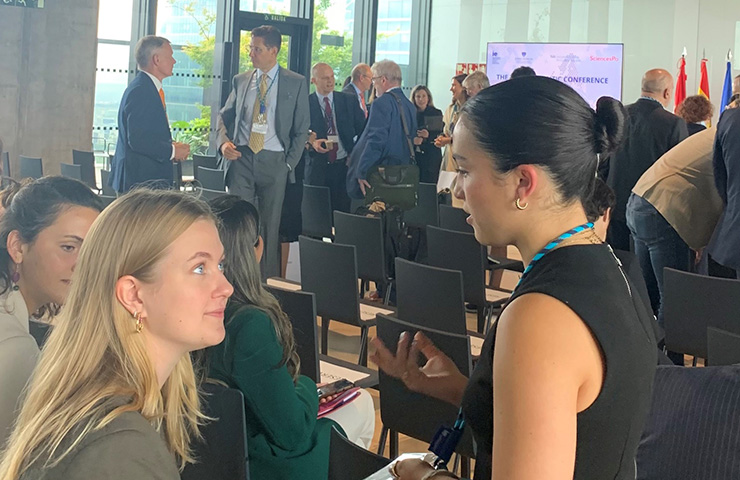
As Diana Amable, Master in International Development student, points out, “I have personally met and connected with people that I would not have had access to easily if not for this volunteering opportunity.” On a different note, Mariana Ferreira also highlighted how “it is these kinds of rare opportunities that have expanded [her] professional skillset and perspective on global politics.”
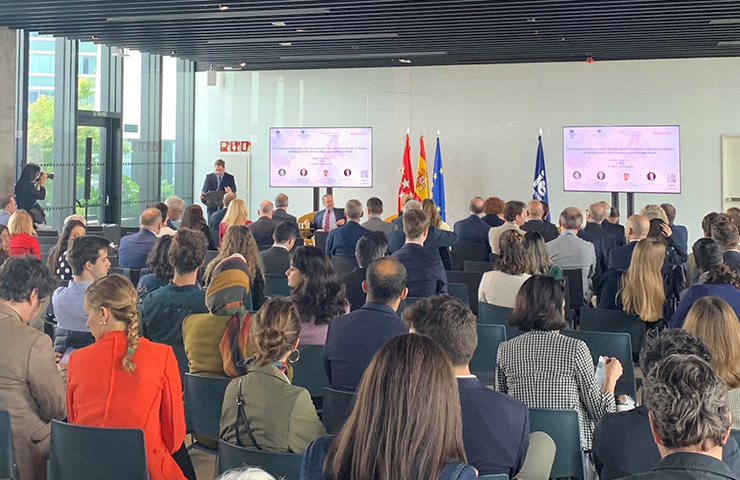
Looking back on their experience, the students encourage their peers to get involved with future editions of the Transatlantic Conference.
Diana summarizes the reasons why best: “It is a golden opportunity, so make the most of it…Network with the participants and gain some valuable insights from them, even beyond the conference.”
Unlock unique opportunities for impact and start building your global profile
At IE School of Politics, Economics & Global Affairs, we offer our students limitless avenues to learn beyond the classroom and create positive impact.


